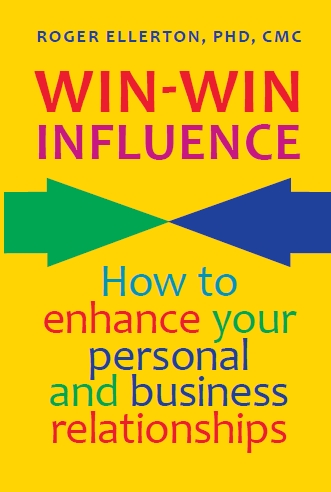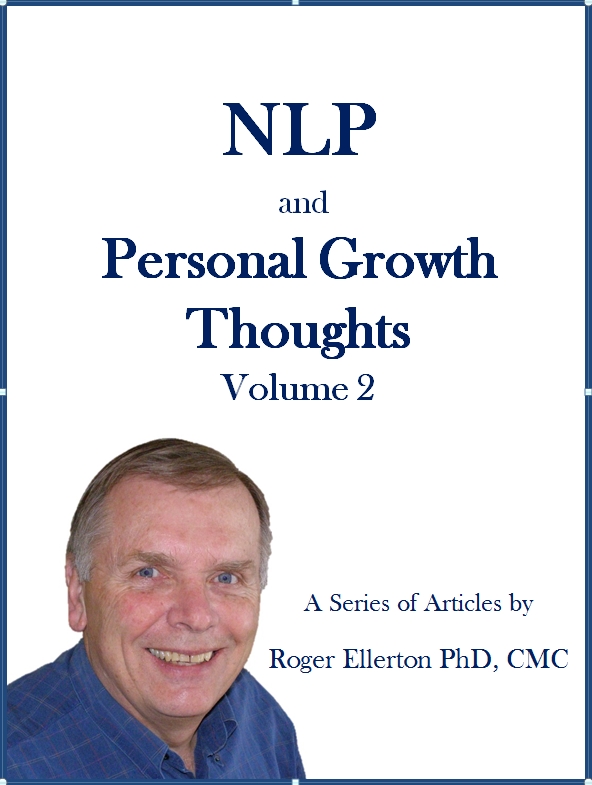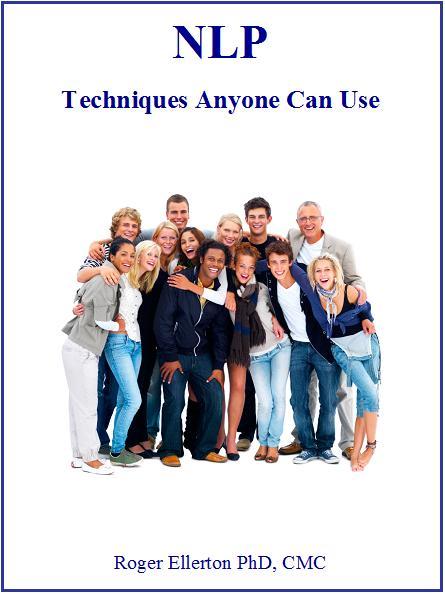Reframing
By Roger Ellerton Phd, ISP, CMC, Renewal Technologies Inc.
This article may not be republished without written permission from Roger Ellerton/Renewal Technologies Inc. If you republish this article without permission, you will be in violation of copyright law and sent an invoice. You may share this and other pages with your friends by linking directly to this page from your website or blog.
In the article, NLP Frames, we discussed frames and how a frame provides a context or focus for your thoughts and actions. Just as a picture frame puts borders or boundaries on what you can see in a picture, the frames of reference that you choose as a result of your beliefs about yourself and others, your perceived role in life, your perceived limitations in skills/abilities, etc. can limit what you see as possible or can open up all sorts of possibilities. You (and if you allow them, others) are continually setting timeframes, boundaries, limits, etc. on what you can and can't do - often without any real thought about the consequences or if the limitations are true.
Changing the frame of an experience can have a major influence on how you perceive, interpret and react to that experience. Being told that you have one hour to complete a task will most likely result in a different emotional state, approach and quality of work than if you are told that you have one week to accomplish the same task. This illustrates how a change in frame (in this case a timeframe) can have a significant impact on the choices you make. Changing the frame of reference is called reframing in NLP. The purpose of reframing is to help a person experience their actions, the impact of their beliefs, etc. from a different perspective (frame) and potentially be more resourceful or have more choice in how they react.
Reframing going on all around us:
- Politicians are masters at reframing. It seems no matter what happens, they can put a positive spin on it for themselves or a negative spin for their opponents.
- You may be frustrated at your wife for inviting the elderly gentleman next door for supper. Until she points out that if you were in his shoes, then you may find this simple act to be the highlight of your week.
- Consider that old wooden table in the basement that you use as a temporary workbench for sawing wood, nailing things together, etc. Instantly, it is seen differently if some tells you that it is a valuable antique.
- Jokes are reframes - you are guided to think in one frame and then the frame (meaning or context) changes. How many psychologists does it take to change a light bulb? Answer: Only one, and the light bulb must want to change!
- Fairy tales often use reframes to help children see different perspectives or consequences - e.g. crying wolf.
- An excuse is a reframe that attributes a different meaning or context to your behaviours.
Some more notable reframes are:
- During the 1984 US Presidential campaign, there was considerable concern about Ronald Reagan's age. Speaking during the presidential debate with Walter Mondale, Reagan said "I will not make age an issue of this campaign. I am not going to exploit, for political purposes, my opponent's youth and inexperience." Reagan's age was not an issue for the remainder of the campaign!
- There is a story about Thomas Watson Sr., the first President of IBM. A young worker had made a mistake that lost IBM $1 M in business. She was called in to the President's office and as she walked in said, "Well, I guess you have called me here to fire me." "Fire you?" Mr. Watson replied, "I just spent $1 M on your education!"
- A father brought his head-strong daughter to see Milton Erickson - the famous hypnotherapist. He said to Erickson, "My daughter doesn't listen to me or her mother. She is always expressing her own opinion." After the father finished describing his daughter's problem, Erickson replied, "Now isn't it good that she will be able to stand on her own two feet when she is ready to leave home?" The father sat in stunned silence. That was the extent of the therapy - the father now saw his daughter's behaviour as a useful resource later in her life.
Content and Context Reframes
In NLP, there are two basic forms of reframes - content (or meaning) and a context reframes.
Content Reframe:
The content or meaning of a situation is determined by what you choose to focus on. An electrical power failure can be viewed as disruptive, a major disaster given all you have to get done. Or it can be viewed as an opportunity to spend some intimate time with your spouse or to have fun with your children finding innovative ways to manage the situation.
A content reframe is useful for statements such as: 'I get annoyed when my boss stands behind me while I am working.' Notice how the person has taken the situation and given it a specific meaning - which may or may not be true - and in so doing limits her resourcefulness and possible courses of action. To reframe this situation, remember the NLP presupposition 'Every behaviour has a positive intention' and ask questions such as:
- What other meaning could the boss' behaviour have? Or for what purpose does he do it? A possible reframe might be: 'Is it possible he wants to help and does not know how to offer his assistance in any other way?'
- What is the positive value in this behaviour? The positive value could be related to the boss' behaviour (as above) or it could be related to the speaker's behaviour. A possible reframe might be: "Isn't it great that you know your boundaries and are not prepared to allow someone to violate them?"
If you are experiencing a physical problem (including phobias and allergies), you may ask yourself, "Is this problem useful to me in some way?" For example, it may give you permission to say 'no'. If this is the case, you could ask yourself, "Is there some other way that I can get this same result without having to have the physical problem?" And just maybe the physical problem will disappear.
Context Reframe:
Almost all behaviours are useful or appropriate in some context. Interrupting a speaker by standing up and offering your view in the middle of her lecture may be judged as inappropriate. To do this same behaviour at the end of the presentation in order to provide a different perspective may be welcomed by all present.
A context reframe is useful for statements such as: "I am too pushy." or "I wish I did not focus on what could go wrong." In this type of situation, your client has assumed that this type of behaviour has no value. Your job is to discover when it is of value by asking yourself the question "When or where would this behaviour be useful or viewed as a resource?" A possible reframe might be: "Isn't that a great skill to have when you need to get things done or to avoid potential problems?" Once you have your client more resourceful, you can then assist him to discover behaviours that may be more appropriate in other situations.
Children and Parenting
Children exhibit all sorts of behaviours - some appropriate and some not so appropriate. Focusing mainly on a child's inappropriate behaviours, may result in the child feeling overly criticized or attacked; resulting in an increase in problem behaviour or the child becoming overly defensive. As an alternative, a parent may choose two courses of action:
- Assuming every behaviour has a positive intention, the parent may choose to discover the positive intention. Then the parent can discuss with the child other behaviours that would meet both the parent's and child's needs.
- The parent may point out where or in what context that type of behaviour is acceptable; thus validating to the child that his behaviours are useful in certain contexts.
The former is an example of a content reframe and the later an example of a context reframe.
Concluding Thoughts
When presenting a reframe to another person:
- Make sure you have rapport and their permission to offer it.
- You may believe your reframe is the best ever and yet it may not work for the other person - simply because they have a different model of the world than you do. Remember the NLP presupposition - There is no failure, only feedback - and explore other possible reframes.
- If you present the reframe in the form of a question or a metaphor (story), it will most likely be more fully considered by your client than if you present it as a statement of fact.
- I hear too many NLP novices say they 'reframed' someone, when in fact you can't reframe anyone other than yourself. The best you can do is to ask someone to consider your reframe and then he can choose whether or not it reframes his experience.
And NLP is Much more than that!
Author: Roger Ellerton is a certified NLP trainer, certified management consultant and the founder and managing partner of Renewal Technologies. The above article is based on his book Live Your Dreams Let Reality Catch Up: NLP and Common Sense for Coaches, Managers and You.
Copyright © 2004, Renewal Technologies Inc. All rights reserved.








